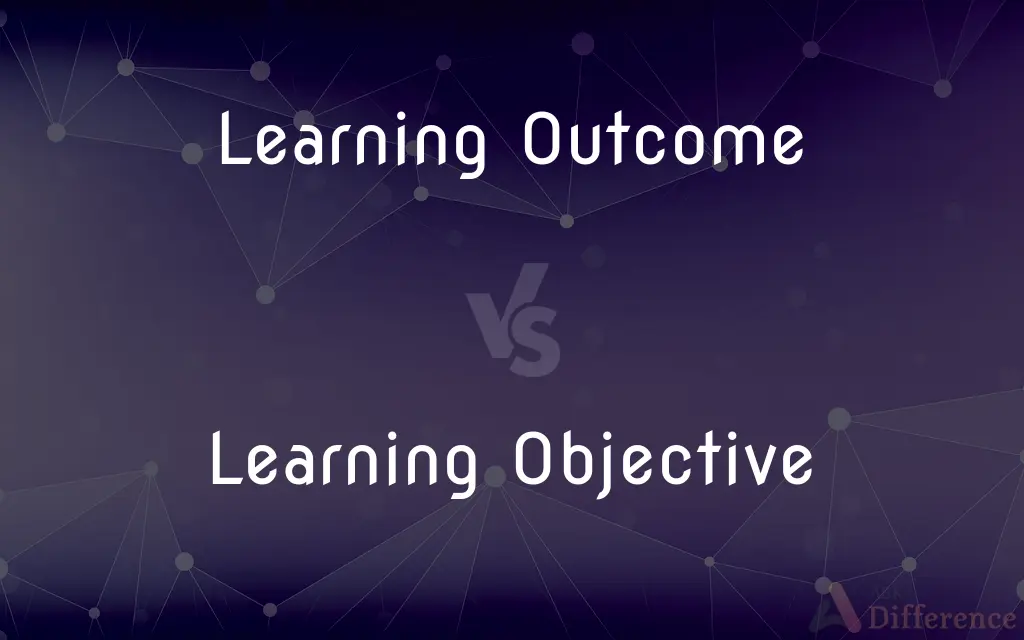Learning Outcome vs. Learning Objective — What's the Difference?
Edited by Tayyaba Rehman — By Fiza Rafique — Published on November 1, 2023
Learning Outcomes are skills or knowledge students are expected to have after a course, while Learning Objectives are goals set by educators for the course content.

Difference Between Learning Outcome and Learning Objective
Table of Contents
ADVERTISEMENT
Key Differences
Learning Outcomes describe what students should know, understand, or be able to do after completing a learning process, whereas Learning Objectives specify what educators aim to teach or what students will learn during the course or lesson.
Learning Outcomes focus on the end results, showcasing the destination the educational journey is meant to reach. In contrast, Learning Objectives are the roadmap, outlining the educational paths that students and educators will take.
Learning Outcomes are often used to evaluate a student's success in meeting the intended educational end goals. However, Learning Objectives serve as a framework for how instruction will be designed to achieve those end goals.
While Learning Outcomes are centered around the student's perspective and what they will gain, Learning Objectives are from the educator's viewpoint, detailing what they plan to teach or what competencies they aim to impart.
Learning Outcomes require assessment methods to measure whether they have been achieved, whereas Learning Objectives need instructional strategies and activities to ensure they are effectively taught.
ADVERTISEMENT
Comparison Chart
Focus
End result of learning
Goals of instruction
Perspective
Student-centered
Educator-centered
Usage
Assessment of student's knowledge or skills
Planning and delivering educational content
Nature
Descriptive of expected achievements
Prescriptive of teaching goals
Measurement
Evaluated through assessments and evaluations
Implemented through instructional strategies
Compare with Definitions
Learning Outcome
A measurable change in behavior, attitude, or skill set post-instruction.
A significant Learning Outcome was the students' enhanced critical thinking abilities.
Learning Objective
An aim that guides the development of the course or lesson plan.
Setting a clear Learning Objective helped the teacher design a more focused and coherent lesson.
Learning Outcome
The end result that indicates the completion of specific learning goals.
The course had a strong focus on practical skills, and the Learning Outcome was evident in the students' projects.
Learning Objective
An educational goal that dictates the direction of the lesson and measures the student's learning process.
The Learning Objective was not only to memorize historical facts but also to understand their contemporary relevance.
Learning Outcome
The knowledge or skills students acquire after a learning process.
The main Learning Outcome was students' improved ability to communicate in a foreign language.
Learning Objective
A specific goal set for what students should learn during a lesson or course.
The Learning Objective was for students to understand the fundamentals of photosynthesis.
Learning Outcome
The final product of the educational process showcasing students' learning achievements.
The most impressive Learning Outcome was the students' ability to solve complex mathematical problems efficiently.
Learning Objective
A statement that describes the desired goal of a course in terms of demonstrable skills or knowledge.
One Learning Objective involved students being able to analyze literary texts critically.
Learning Outcome
A demonstrable skill or competency students develop after a course or program.
Students demonstrated the Learning Outcome of improved public speaking through presentations.
Learning Objective
A concise description of what students are expected to learn by the end of the course or lesson.
The Learning Objective of writing a research paper was to teach students how to conduct independent research.
Common Curiosities
Are Learning Outcomes the same as Learning Objectives?
No, Learning Outcomes are the expected knowledge or skills students should display after learning, while Learning Objectives are the instructor's goals for what will be taught.
Are Learning Objectives necessary for every lesson?
Yes, Learning Objectives guide lesson planning and provide clear goals for student learning.
Who determines the Learning Outcomes?
Educators set Learning Outcomes based on curriculum standards and educational goals.
How specific should Learning Outcomes be?
Learning Outcomes should be specific enough to provide clear expectations and allow for measurable assessment.
What's the relationship between Learning Objectives and classroom activities?
Classroom activities should be designed to meet Learning Objectives, providing relevant experiences and skill development.
What's the benefit of having clear Learning Objectives?
Clear Learning Objectives provide a roadmap for teaching and learning, ensuring content relevancy and focus.
Can Learning Outcomes be measured?
Yes, Learning Outcomes are often measured through tests, assignments, or practical applications to assess student proficiency.
Who should be aware of the Learning Objectives in a course?
Both educators and students should be aware of Learning Objectives to ensure aligned expectations and outcomes.
Do Learning Outcomes affect curriculum design?
Yes, Learning Outcomes often drive curriculum design, ensuring content relevance and goal alignment.
How are Learning Outcomes used in assessments?
Assessments are designed to measure whether students have achieved the specified Learning Outcomes.
Can Learning Outcomes evolve over time?
Yes, Learning Outcomes can evolve based on the educational environment, student needs, and academic advancements.
How detailed should Learning Objectives be?
Learning Objectives should be detailed enough to provide clear direction yet flexible enough to accommodate diverse learning paths.
What role do Learning Objectives play in student success?
Learning Objectives provide clear goals, helping students understand expectations and guiding their learning efforts for success.
Why are Learning Outcomes important in education?
Learning Outcomes ensure that courses meet educational goals and students acquire desired knowledge or skills.
Can Learning Objectives vary between courses?
Absolutely, Learning Objectives are tailored to the specific goals of each course or subject matter.
Share Your Discovery

Previous Comparison
Iodized Salt vs. Non-iodized Salt
Next Comparison
Participant vs. ContestantAuthor Spotlight
Written by
Fiza RafiqueFiza Rafique is a skilled content writer at AskDifference.com, where she meticulously refines and enhances written pieces. Drawing from her vast editorial expertise, Fiza ensures clarity, accuracy, and precision in every article. Passionate about language, she continually seeks to elevate the quality of content for readers worldwide.
Edited by
Tayyaba RehmanTayyaba Rehman is a distinguished writer, currently serving as a primary contributor to askdifference.com. As a researcher in semantics and etymology, Tayyaba's passion for the complexity of languages and their distinctions has found a perfect home on the platform. Tayyaba delves into the intricacies of language, distinguishing between commonly confused words and phrases, thereby providing clarity for readers worldwide.















































